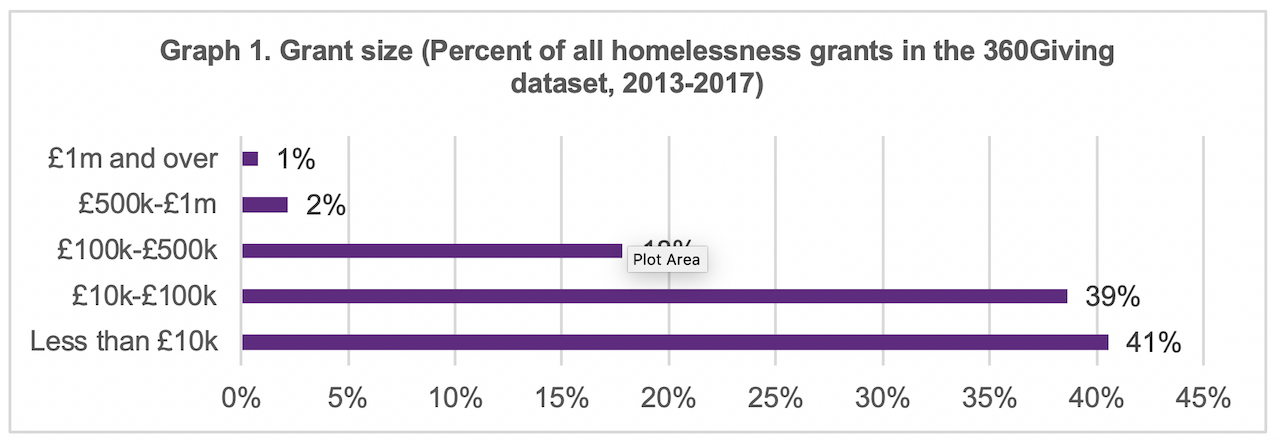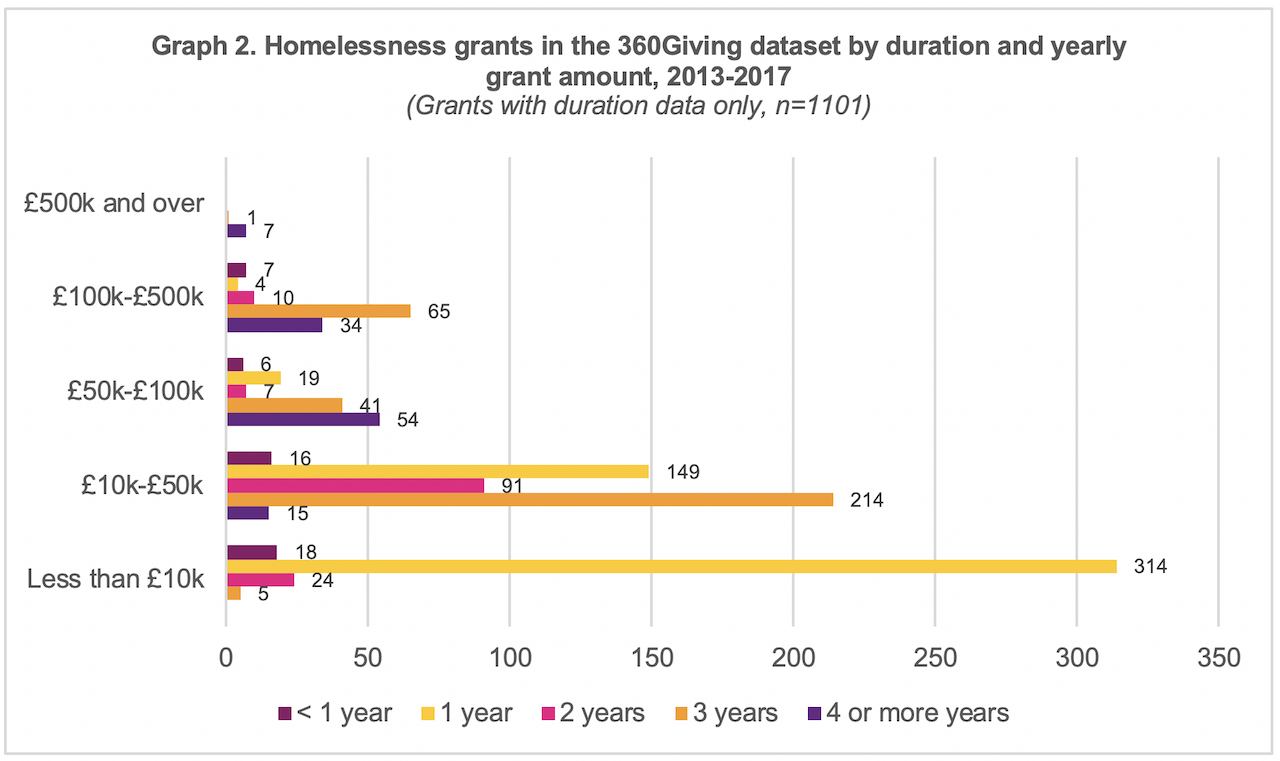What can 360Giving data tell us about homelessness funding?
This is a guest post by Carin Eisenstein of NPC.
Homelessness is a modern crisis and NPC is interested in how philanthropy can be more effective in tackling it.
 We recently launched a report on the homelessness crisis in the UK and the need for systemic funding. As part of this research, we wanted to understand which private trusts and foundations fund homelessness interventions, which organisations they’re funding, and what the funding looks like. With financial support from the Indigo Trust, we analysed 360Giving grants data and Charity Commission data. In this blog post we summarise findings from the grants data.
We recently launched a report on the homelessness crisis in the UK and the need for systemic funding. As part of this research, we wanted to understand which private trusts and foundations fund homelessness interventions, which organisations they’re funding, and what the funding looks like. With financial support from the Indigo Trust, we analysed 360Giving grants data and Charity Commission data. In this blog post we summarise findings from the grants data.
Thanks to David Kane and Mor Rubinstein at 360Giving for their support preparing the dataset, and to the Centre for Homelessness Impact for input in the early stages of this research.
Our approach
We used 360Giving grant data available on the GrantNav application[1] to begin to answer these questions.
We filtered the dataset (extracted July 2018) to include only grants with key words related to homelessness in the grant name or description. We started with a long list of key words, including: “housing”; “complex needs”; “dual diagnosis”; “hostel”; and “day centre”. These yielded many false positives (grants that had nothing to do with homelessness), so we narrowed the list down to: “homeless” and “homelessness”, “rough sleeping”, and “sofa surfing”.
Key findings
- Grants related to homelessness represent just 1% of all grants reported to 360Giving.
- Three in five 360Giving contributors have made grants to support homelessness.
- Grants tend to be small (less than £10k per year) and for one year, with fewer large-scale, multi-year grants.
What is the scale, quantity and duration of homelessness grants?
We found 2466 homelessness-related grants (to 1443 recipients), totalling £282m in funding, since 1997. Based on the filter we used, homelessness grants represent around 1% of all grants on GrantNav.
Since not all funders report grants for each year, year-to-year comparisons of GrantNav data are difficult. We therefore looked at funding to homelessness over the past five years to look at basic characteristics of the funding like the size and duration of grants.
From 2013 to 2017, there were 1406 homelessness-related grants (to 923 recipients), totalling £162.4m. The average grant was £115k, but this is skewed by some large (over £1m) multi-year grants from Big Lottery and London Councils (see Table 1). Most grants (80%) were less than £100k (see Graph 1).
Table 1. Top homelessness grants in the 360Giving dataset by amount awarded (over £1m), 2013-2017
| Recipient | Funder | Amount Awarded (£) | Grant amount per year (£) | Duration of grant |
| Shelter | Big Lottery | £9.9m | £1.1m | 9 years |
| SHP | Big Lottery | £7.7m | £860k | 9 years |
| New Horizon Youth Centre | London Councils | £4.0m | £1.0m | 4 years |
| Shelter | London Councils | £4.0m | £1.0m | 4 years |
| Northern Inclusion Consortium Limited | Big Lottery | £3.7m | £1.0m | 3.5 years |
| Great Yarmouth Borough Council | Big Lottery | £3.1m | £615k | 5 years |
| New Horizon Youth Centre | London Councils | £2.9m | £730k | 4 years |
| Shelter | London Councils | £2.6m | £650k | 4 years |
| St Mungo’s | London Councils | £1.6m | £391k | 4 years |
| Thames Reach | London Councils | £1.5m | £376k | 4 years |
| St Mungo’s | London Councils | £1.0m | £251k | 4 years |

Duration of funding varied, with one- and three-year grants most common (35% and 23%, respectively)[2]. If we look at the total grant amount spread over the duration of grant (assuming equal distribution of funding), the average yearly funding was £44k (we could only compute this for grants with information on duration, available for 78% of grants).
Grants tended to be small and short term, with fewer large-scale, multi-year grants (see Graph 2, which shows the number of grants by duration and funding per year). Over 300 grants—around three in ten—were for less than £10k over one year.

Who gives grants related to homelessness?
There were 86[3] funders in the GrantNav database when we conducted our research. Out of these, 52 (60%) had funded at least one project related to homelessness, going back to 1997.
The top 10 homelessness funders from 2013 to 2017 are shown in Table 2. The Big Lottery Fund is by far the largest funder in terms of amount awarded (around £108m in five years’ time, representing 67% of total funding to homelessness in this period).
For the top funders, we also looked at what proportion their funding to homelessness represents out of all funding they have reported to 360Giving. London Councils comes out at the top with 40% of its funding going to grants related to homelessness, followed by the Nationwide Foundation at 26%.
Table 2. Top 10 funders of projects related to homelessness in the 360Giving dataset, 2013-2017
| Funder | Total amount awarded to homelessness (2013-2017) | Percent of all reported funding awarded to homelessness |
| The Big Lottery Fund | £108.3m | 3% |
| London Councils | £21.2m | 40% |
| Lloyds Bank Foundation for England and Wales | £7.5m | 9% |
| The Henry Smith Charity | £6.4m | 6% |
| The Tudor Trust | £3.4m | 4% |
| Esmée Fairbairn Foundation | £ 3.2m | 2% |
| Northern Rock Foundation | £ 1.7m | 16% |
| BBC Children in Need | £ 1.3m | 1% |
| Nationwide Foundation | £ 1.0m | 26% |
| Paul Hamlyn Foundation | £ 888k | 2% |
Who receives grants related to homelessness?
The top 10 recipients in terms of amount of funding received in the past five years are shown in Table 3. Shelter received the most funding related to homelessness in this period (£16.8m), followed by New Horizon Youth Centre (£8.2m), and the Single Homeless Project (£7.7m).
Large charities (with income over £1m) receive the most funding. We know that there are several other major homelessness charities not listed below. This may be because they have other significant sources of income such as from trading, rent, social investment or local authority contracts.
Table 3. Top 10 recipients of homelessness related funding by amount awarded in the 360Giving dataset, 2013-2017
| Grantee | Total awarded 2013-2017 | Income y/e 2017 |
| Shelter | £16.8m | £60.9m |
| New Horizon Youth Centre | £8.2m | £1.6m |
| Single Homeless Project (SHP) | £7.7m | £18.9m |
| Northern Inclusion Consortium Limited | £3.7m | Not listed as a charity |
| St Mungo’s | £3.5m | £86.5m |
| Great Yarmouth Borough Council | £3.1m | Not listed as a charity |
| Crisis UK | £2.5m | £35.2m |
| Thames Reach | £1.5m | £15.8m |
| Homeless Link | £1.5m | £4.4m |
| First Housing Aid & Support Services | £1.4m | Not listed as a charity |
Grantees received an average of one to two grants in the five-year period, and as many as 11 grants (to Safe and Sound Homes).
When we look at the top 10 recipients in terms of the number of grants received, there are more medium-sized charities (income of £100k to £1m). However, large charities also received numerous grants.
Limitations and opportunities
This is a first view of philanthropic funding to homelessness—there’s much more to learn about this funding and whether it is being channelled effectively. There are three main challenges—and opportunities—with this in mind.
1. We need more funder data
360Giving data was essential to this research. However, there are still a handful of key funders missing, as well as data from funders we’re not aware of, and from local authorities outside of London.
Piloting working with and publishing data from homelessness funders we know are not yet on 360Giving could help us get a better understanding of where there are funding gaps.
As more funders submit data, we’ll be able to build an increasingly complete picture of the funding landscape—both to better understand how funders which we know support homelessness direct their funds, and to identify funders we may not know are contributing.
Looking at other funding streams, especially local authority grants and contracts related to homelessness and statutory funding, will also help us understand the homelessness funding landscape. Having data from London Councils and GLA is an important first step—without London Councils data we would have missed one of the largest homelessness funders. However, accessing and aggregating all local authority grants, contracts and statutory funding data, and reaching beyond London, will be a challenge, and resource-intensive.
2. We need better Charity Commission data
Parallel to our analysis of funder data, we looked at Charity Commission data to identify charities working on homelessness. We wanted to use 360Giving data to get insight into who funds these charities and what types of services get funded. However, patchy Charity Commission data and broad categories for beneficiary, purpose, and activity type, made it difficult to create a reliable sample or identify meaningful sub-types of services—not to mention the challenge of even getting the data into a format we could use.
Better quality and more accessible charity data is crucial to being able to triangulate information with other data sources, like 360Giving. A first step for the Charity Commission would be to publish data in a more accessible format (eg, in CSV files, rather than BCP file format, which requires much more expertise). A second step would be to assist charities to submit more standard information about what they do and what sectors they work in—a shared data standard would help with this, as previously suggested on this blog.
3. We need agreed ways of identifying homelessness interventions
Our analysis of funder and charity data revealed that—patchy data aside—identifying homelessness funding, or charities that work with homelessness, is challenging because of the wide range of interventions that might qualify. We chose to use more conservative filtering criteria to start, which means we have likely excluded an unknown number of charities.
We would like to explore more sensitive ways of identifying homelessness interventions, including ones that might not describe their work using the word ‘homelessness’—perhaps because they have more of a preventative focus, or perhaps because they choose to take a more asset-based approach. Having an agreed approach to identifying these types of intervention would help.
If we are to strategically address the homelessness crisis, and make sure money is well spent, we need better data and shared approaches to using it. Funders can help by publishing complete data on 360Giving or supporting efforts to collect better evidence. The Charity Commission can take steps to make its data more accessible and useful for research. For people interested in exploring more opportunities to fund work on homelessness, read our report or get in touch.
Notes
[1] GrantNav is a 360Giving application released under the terms of the Creative Commons Attribution Sharealike license (CC-BY-SA)
[2] In our report, “Tackling the Homelessness Crisis” we reported that most of the grants in the last five years were for one year or less, with some charities receiving up to 45 grants (p. 15). These findings relate to a broader sample, which also includes charities we had identified in Charity Commission data as working on homelessness.
[3] We conducted our research in July 2018. As at December 2018 there is data for 97 funders on GrantNav.
